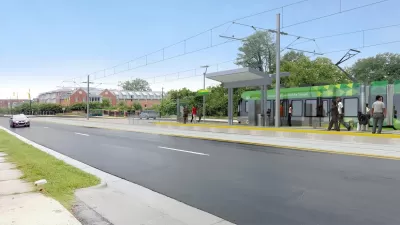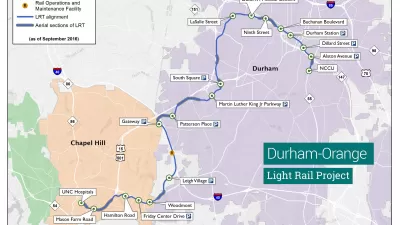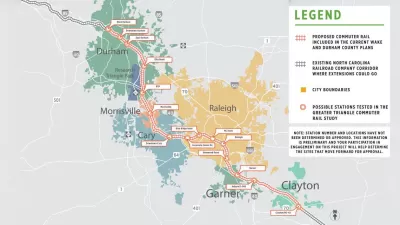Duke University will not sign an agreement for a regional rail project that has widespread support from the campus community.

On February 27, Duke University announced it would not sign a cooperative agreement for the Durham-Orange light rail project, a $3.3-billion, 17-mile rail line that would connect UNC-Chapel Hill, Duke, downtown Durham, and North Carolina Central University.
Ahead of the decision, 51 Duke faculty and staff signed onto a letter urging the university to support the project. The letter outlines the various benefits the rail line would bring to the region, including affordable housing, access to jobs and education, and improved air quality.
The university has raised a series of concerns about the rail project, but GoTriangle, the regional transit agency, says it has worked to address these issues. "For example, to quiet concerns Duke officials had about electric power connections with Duke Medical Center, GoTriangle added a $90-million elevated portion for the light rail," reports Angie Schmitt.
GoTriangle and Durham County officials are asking Duke to participate in a mediation process to address the university’s concerns.
FULL STORY: Duke Climate Scientist Criticizes the University’s Light Rail Obstructionism

Alabama: Trump Terminates Settlements for Black Communities Harmed By Raw Sewage
Trump deemed the landmark civil rights agreement “illegal DEI and environmental justice policy.”

Planetizen Federal Action Tracker
A weekly monitor of how Trump’s orders and actions are impacting planners and planning in America.

The 120 Year Old Tiny Home Villages That Sheltered San Francisco’s Earthquake Refugees
More than a century ago, San Francisco mobilized to house thousands of residents displaced by the 1906 earthquake. Could their strategy offer a model for the present?

BLM To Rescind Public Lands Rule
The change will downgrade conservation, once again putting federal land at risk for mining and other extractive uses.

Indy Neighborhood Group Builds Temporary Multi-Use Path
Community members, aided in part by funding from the city, repurposed a vehicle lane to create a protected bike and pedestrian path for the summer season.

Congestion Pricing Drops Holland Tunnel Delays by 65 Percent
New York City’s contentious tolling program has yielded improved traffic and roughly $100 million in revenue for the MTA.
Urban Design for Planners 1: Software Tools
This six-course series explores essential urban design concepts using open source software and equips planners with the tools they need to participate fully in the urban design process.
Planning for Universal Design
Learn the tools for implementing Universal Design in planning regulations.
Clanton & Associates, Inc.
Jessamine County Fiscal Court
Institute for Housing and Urban Development Studies (IHS)
City of Grandview
Harvard GSD Executive Education
Toledo-Lucas County Plan Commissions
Salt Lake City
NYU Wagner Graduate School of Public Service





























